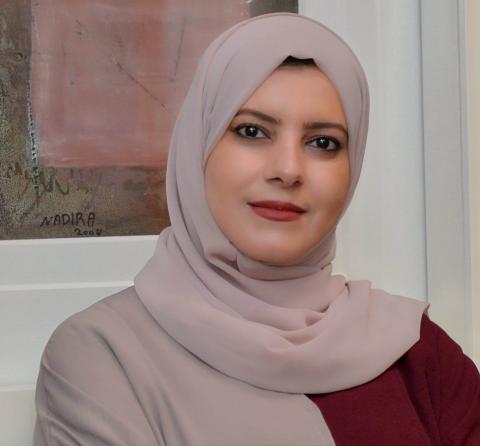Interview with Longlisted Author Badriya Albadri
25/01/2024

When did you begin writing Foumbi and where did the inspiration for it come from?
I began writing Foumbi at the end of 2017, during the creative writing workshop for talented young writers organised by the International Prize for Arabic Fiction in co-operation with the Muscat Cultural Club, in which a group of Omani and Arab writers took part. The basic idea was inspired by the story of Pingha, a Congolese man whose family were killed, and he was then sold and taken to Europe to be displayed at a zoo, as an example of the missing link between monkeys and humans. The novel even had ‘Pingha’ as its original title, but afterwards it expanded
to become a portrayal of the historical epoch when this event took place, and the title was finally changed to ‘Foumbi’.
I can’t describe the intense pain I felt, as I saw a human being living in a cage for monkeys, stripped of all his human attributes, his feelings, denuded of all real existence.
From this point on, I began to do research into the history of the Congo and the period in which Pinga was enslaved, a time of oppression, slavery, murder, and looting of wealth, under the false slogans of spreading Christianity, civilization, and abolishing slavery. In reality, these were merely justifications for colonising countries seeking to achieve their interests. The novel clothes itself in the garb of history, but in a deeper sense it deals with humanity, the right of a human being to live free and dignified in every time and place.
The novel, much like life itself, is not complete without the roundedness of its characters, with the good and evil they carry within them. It portrays diverse characters who take it in turns to give their views and justifications of what they did, so the reader can see the truth from their point of view, without any intervention by the author. All the author does is to pull back the curtain hiding corners which may not be visible with the naked eye, allowing the reader to pause and reflect on what is said between the lines, and the connection between the world of the novel and that of today. Although there are many characters, each contributes to the overall picture of life. The events blend reality and imagination and all the endings are left open. No single character is the principal protagonist or main actor, because each character has been carefully chosen. Pinga, for example, appears just once, but he symbolises the indirect victims created by the main event of the novel.
Did the novel take long to write and where were you when you finished it?
Writing Foumbi took nearly five years, not consecutively of course, but even in periods when I’d stopped writing, it occupied my heart and mind. I started and finished it in the Sultanate of Oman.
Do you have writing rituals?
When I am in the flow of writing, I write anywhere. I carry my laptop with me wherever I go, and I try and withdraw from the people around me by putting on headphones and listening to music. But my favourite time for writing is after midnight when the world sleeps and the souls inhabiting my novel awaken to exercise their right to life. At this time, I feel that I am just a part of this fictional world.
What is your next literary project after this novel?
Foumbi has really tired me out. It has taught me how to wait and be patient. So, I am now having the break of a soldier in wartime. I have many fictional ideas, and I think I’m inclining towards one of them, but I haven’t yet reached the stage of beginning to write. I am waiting for its time to come, with extreme calm, the calm before the storm.
